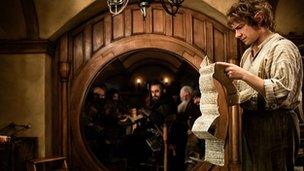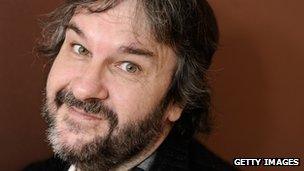Peter Jackson unsurprised by critics of Hobbit footage
- Published

Sherlock star Martin Freeman stars as protagonist Bilbo Baggins in the films
Director Peter Jackson claims to be unsurprised by the mixed reaction to footage from his long-anticipated film The Hobbit earlier this week.
"It wasn't particularly surprising because it is something new," Jackson told <link> <caption> the Hollywood Reporter</caption> <url href="http://www.hollywoodreporter.com/news/peter-jackson-the-hobbit-cinemacon-317755" platform="highweb"/> </link> .
But he added: "Ultimately, it is different in a positive way, especially for 3D, especially for epic films."
The 3D film has been shot at a rate of 48 frames per second, compared with the industry standard of 24 frames.
The 10 minutes of unfinished footage, shown at the CinemaCon convention in Las Vegas last week, was criticised as uncinematic - with some detractors claiming it "looked like a made-for-TV movie".
"It does take you a while to get used to," admitted Jackson. "Ten minutes is sort of marginal, it probably needed a little bit more.
"Another thing that I think is a factor is it's different to look at a bunch of clips - and some were fast-cutting, montage-style clips. This is a different experience than watching a character and story unfold."
Jackson told the Hollywood Reporter that he had no plans to shoot a trailer for the film using the same 48-frame-per-second technique.
"The 48 frames is something you should experience with the entire film. A two-and-a-half minute trailer isn't enough time to adjust to the immersive quality."

New Zealand's Peter Jackson won the best director Oscar for The Return of the King in 2004
The Hobbit: An Unexpected Journey is the first chapter in Jackson's two-part adaptation of JRR Tolkien's fantasy classic.
The two films were shot back-to-back in 3D, with the second part, The Hobbit: There and Back Again, due in cinemas in December 2013.
Oscar-winning filmmaker Jackson believes the new filming format will take time for viewers to adjust to.
But added: "As another creative tool, I think it's a really important thing.
"Advocating that we have to stick with what we know, I think is a slightly narrow-minded way of looking at things when as an industry we are facing declining audiences.
"We have to find ways to make it more vibrant, more immersive - something that will encourage people to come back to the theatres for that experience."
- Published25 April 2012
- Published9 February 2012
- Published21 December 2011
- Published21 December 2011